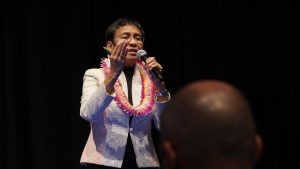When Rodrigo Duterte took office in June 2016 as the president of the Philippines, he fulfilled an election promise by launching a “war on drugs.” The controversial campaign led to an indiscriminate killing spree by police and vigilantes in the months following the inauguration. Duterte personally urged citizens to gun down drug dealers and boasted about having shot criminals when he was mayor of Davao. Despite the excesses and a mounting death toll, a majority of citizens backed Duterte’s campaign. In her new book, “How to Stand Up to a Dictator,” journalist and Nobel laureate Maria Ressa looks back at that period, baffled by the bloodlust of her fellow citizens. “That Filipinos would condone and even support killing drug addicts and pushers is shocking to me,” she writes.
How did people in the Philippines come around to endorsing extrajudicial killings as an acceptable solution to the drug problem?
The war on drugs, Ressa explained, played out on the streets and the internet. The Duterte administration, advertising agencies, and political proxies used social media to influence public opinion and build support for the campaign. Citizens of the Philippines are a highly receptive audience. A nation of avid internet users, Filipinos spend more time on the internet than any other nation and have a well-known affinity for Facebook. In a recent interview, Ressa observed, “Facebook is our internet.” Filipinos had 60 percent more Facebook friends than the global average, and in 2017, 97 percent of the population was on the platform. The country was also host to a shadowy online subculture where troll farms, internet scams and dubious political operators thrived. The Philippines became “ground zero for terrible effects that social media can have on a nation’s institutions, its culture, and the minds of its populace.”
Among the social media players who drummed up public support for the war on drugs were groups of young influencers who had mastered the art of making hashtags trend on Facebook. One of them, referred to in the book as “Sam,” began building a network of Facebook groups when he was only 15. Within a few years, he claimed to have 15 million followers across several platforms. Sam’s talent for building connections earned him a spot in the war on drugs campaign. He began posting stories about tourist attractions and local news with an occasional crime story thrown in. He and his Facebook friends would then write comments connecting the crime to drugs, making it appear like the topic was gaining traction.
Facebook calls these concerted efforts “coordinated inauthentic behavior,” but the phenomenon is better known as astroturfing. Ressa believes social media mavens like Sam pushed the issue of drugs from the margins to the center using the technique. “I’m like a god. I can make them do what I want them to do,” boasted the young influencer, his hair spiked with streaks of blue.
Ressa’s insights on Facebook come from first-hand experience. She understood the social network’s inner workings better than most journalists, having collaborated with Facebook after the launch of her website, Rappler. The online publication started as a Facebook page before becoming a top news site known for its innovative, crowdsourced journalism. In 2015, when Facebook was looking for media partners in the region, Rappler was a logical choice. “We had embraced the platform early and knew its performance in the Philippines better than Facebook itself did, often surprising its executives with what we had discovered in our daily data monitoring operations,” writes Ressa. She even toyed with the idea of working for the company: “At the time, I was the truest of true believers in the power of social media to do good in the world.”
By 2016, however, it became clear to Ressa that Facebook had little interest in fighting misinformation. When a Rappler article about a bombing was doctored and deployed in a “clumsily executed information operation,” Facebook did not take down pages that amplified the false narrative. Ressa describes herself as “beyond disillusioned” and believes the company is one of the “gravest threats to democracies around the world.” Unlike traditional media companies, Facebook’s top leadership systematically dismantled barriers between the content and business side to maximize profits. Facebook’s choices “gave a bullhorn for hate speech” across the globe because it was good for business. But the decision had devastating real-world consequences as well. On January 6, 2021, “Silicon Valley’s sins came home to roost” when a mob incited on social media stormed the U.S. Capitol.
Why should the rest of the world pay attention to what happens in the Philippines? In a television interview, Ressa recalled, “In 2016, I said America, look at us. What is happening to us is coming for you.” That warning was not directed at the United States alone. Last week supporters of former President Jair Bolsonaro vandalized the National Congress of Brazil and other government buildings. They were protesting what they falsely claimed was a stolen election. The far-right radicals reportedly connected on private messaging networks like WhatsApp, owned by Facebook’s parent company, Meta Platforms. The tech conglomerate promised to remove any content supporting the insurrection on Facebook.
The Brazil attack is yet another reminder that social media companies may need to be regulated more stringently, a core argument in Ressa’s book.

































